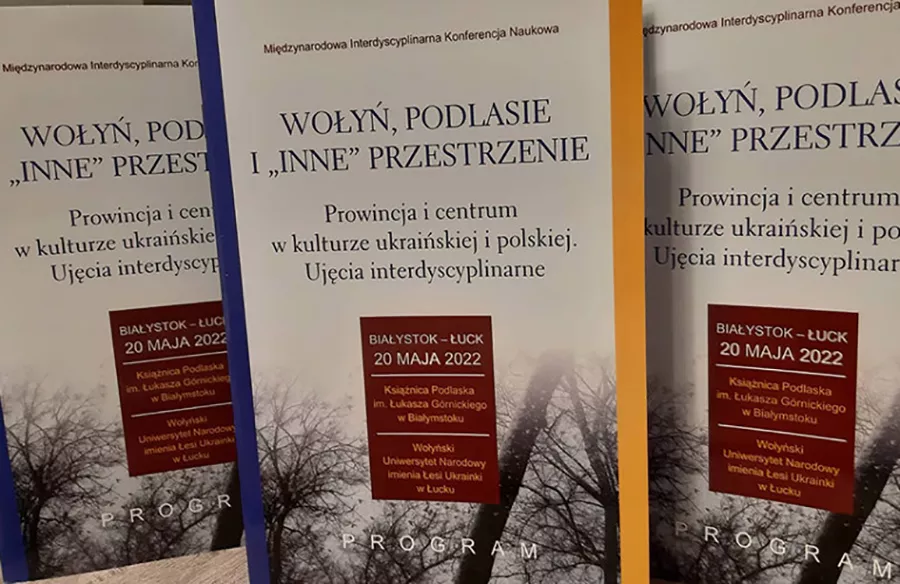On May 20, 2022, the International Scientific Conference "Volyn, Podlasie and"Other "Territories " took place. Province and centre in the Polish and the Ukrainian Literature. Interdisciplinary Approaches ”, co-organised by the Faculty of Philology and Journalism of Lesya Ukrainka Volyn National University and the Faculty of Philology of the University of Białystok (the Republic of Poland). The idea of such joint conference arose long before the full-scale invasion of russia, so it is especially gratifying that the funding from the Ministry of Education and Science of the Republic of Poland under the Regional Excellence Initiative was received.
The philological schools of our universities have a long and rich history, but the chosen format of scholarly conversation with two centres in two neighbouring countries, which come together to call the academics from other cities and countries was extremely productive, especially given the scholarly issues of the conference. By this way, the most pressing issues of modern humanities were raised. These problems included: the literary image of the capital and the province at the crossroads of cultures; Volyn, Podlasie, Polissya in Polish and Ukrainian literature; the ethnoimagological models of Poles and Ukrainians in Ukrainian and Polish literature; heterotopias as "other territories" and their expression in literature; the linguistic dimension of the centre and periphery in the Polish and the Ukrainian literature; theatre, art, sculpture: their image of the province and the centre; the Ukrainian literature in Poland, the Polish literature in Ukraine: the perspective of Volhynia and Podlasie; the overview history of Volyn and Podlasie provinces: literary notes; the image of the centre and periphery in the Polish and Ukrainian media.

The modes of realisation of these phenomena in the Ukrainian and the Polish fiction and documentary literature and the ways they shape or change public opinion were discussed by the researchers not only in Lutsk and Bialystok but also in other cities of Ukraine and Poland (Warsaw, Kyiv, Olsztyn, Ternopil, Lublin, Odesa, Chernivtsi), Riashiv (Rzeszów), Zaporizhzhia, Olsztyn, Dnipro, Poznań, etc.). The participants were especially interested in Yaroslav Polishchuk's "Volyn Novels of Volodymyr Lys from the Perspective of Ecocriticism", Olena Bondarieva's "Gray zone spaces and “orphanage” as metaphors of underloved feelings, mental marginalism and postcolonial indefiniteness in the contemporary Ukrainian literature, “Donetsk as heterotopy in contemporary Ukrainian military prose” by Iryna Kropyvko," Volyn ways of Gabriela Zapolska "by Anna Yanitska," Return to the province as a discovery of your own identity: Igor Kalynets' poetic vision "by Zoriana Lanovyk and Mariana Lanovyk, and selected memoirs of the XIX century "by Magdalena Patro-Kutsab," Volyn text by Romuald Wernik as an inexperienced trauma "by Oleksiy Sukhomlynov," The problem of one's own stranger in the lyrics of contemporary Ukrainian artists in Podlasie "by Associate Professor Viktor Yaruchyk, "Podlasie photographers of the 30th-40th of the twentieth century. Growth from the province " by Urszula Dombrowska, and other works.

The benevolent, intensive rhythm of the conference lasting for 11 hours in a row, could not even be stopped by the fact of three alarms in Ukraine (by the way, because of the potential danger to participants from Ukraine, the organisers were forced to change the format of the meeting). It was initially planned that Lutsk scholars would take part in the conference along with the participants from Białystok, jointly from the conference hall).
The Ukrainian-Polish scholarly conference gained the momentum of greatest rapprochement between our two peoples. Ukrainians feel and greatly appreciate the unprecedented support and solidarity of Poles in a very difficult time in our history. Therefore, we have a reason to once again express our deep gratitude to the Dean of the Faculty of Philology of the University of Białystok, Professor Jarosłav Ławski
and all his colleagues for their great work in organising and holding the conference, for our unity, convenient format, pleasant company and good communication. We are also grateful to the coordinator of the conference from the Faculty of Fine Arts, Professor, Head of the Department of Polish Studies and Translation Svitlana Sukharieva, who while on internship in Białystok, united the philological centres of our cities.

And a pleasant aftertaste is from Mr. Dean Jarosłav Ławsky’s letter:
“It was an amazing, historic conference! I have organised a sheer number of conferences, many in Kyiv and Odesa, but this one will go down in history: the circumstances of the war, our full understanding, acceptance of difficult topics in the spirit of understanding, emotions ... – all these things make an unforgettable impression about the conference. … Yes, it was a marathon but what a successful one. I hope our cooperation will continue! ” Indeed, we hope that our cooperation with Polish colleagues will continue: online, offline or in mixed formats but definitely under the peaceful sky of Ukraine.
Lilia LAVRYNOVYCH,
the Dean of the Faculty of Philology and Journalism
